The University of South Carolina’s College of Education is the first in the Southeast to integrate improvement science approaches into advanced degree coursework. Improvement science is user-centered and problem-centered approached to improving teaching and learning - basically, it's a method used to accelerate how a profession learns to improve itself.
"Within individual schools and school districts it's imperative to have a system in place that helps you identifiy obstacles and then offers the necessary know-how to make a reform plan spread faster and more effectively," said Thomas Hodges, associate dean of academic affairs. "It's also important for our graduate level students here at Carolina to be well versed in improvement science so they can help their employers implement the process."
Recently, the College of Education was invited to take part in a new Carnegie Foundation for the Advancement of Teaching initiative aimed at improving teacher preparation programs while addressing the needs of at-risk schools.
This fall, the Carnegie Foundation launched the iLEAD (Improvement Leadership Education and Development) initiative to enhance and extend the efforts of schools of education to incorporate Improvement Science methods and Networked Improvement Communities into their education doctoral programs. iLEAD helps institutions of higher education and their local school partners enact systematic improvement efforts, within their organizations and in partnership with one another. The USC College of Education chose to partner with the Center for Teaching Quality and Florence School District One to build upon the South Carolina Collective Leadership Initiative as a mechanism for school reform, particularly in rural, high-needs districts.
Engagement with this project provides the USC College of Education with an opportunity to propel our teacher and leadership preparation programs forward, while addressing the local needs of schools and districts in South Carolina.
- Thomas Hodges, associate dean
“Florence School District One has many unique challenges that face many rural districts,” says Kelvin Wymbs, Florence School District One assistant superintendent. “The teacher shortage that is occurring across the nation hampers our efforts to hire quality teachers in our schools. The persistent poverty that has become a symbol of the ‘Corridor of Shame’ forces us to not make excuses as we continually search for ways to improve the quality of life for our stakeholders.”
Over the next year, iLEAD participants, representing 11 universities and public school partners, will engage in four face-to-face meetings and online collaboration to:
- Build leadership, technical and social capacities for using improvement science in master’s and Ed.D. programs;
- Integrate and enhance coursework;
- Collaborate with other universities and the Carnegie Foundation on problems of practice, and embed that work into educational leadership preparation;
- Strengthen relations with local school districts by focusing on relevant and pressing needs; and
- Contribute to and draw from a “Teaching Commons” resource-bank of stellar courses and instructional resources.
“Engagement with this project provides the USC College of Education with an opportunity to propel our teacher and leadership preparation programs forward, while addressing the local needs of schools and districts in South Carolina,” says Thomas Hodges, associate dean for academic affairs. “This project continues our rich history of designing and delivering academic programs in partnership with P-12 schools and districts, ensuring that we develop leaders equipped to address the needs of children, families and communities."
Wymbs says the partnership between Florence School District One and the USC College of Education will improve the district by offering teachers professional development and personal advancement opportunities through the online Master of Education in Educational Administration and the Doctor of Education in curriculum and instruction.
“The knowledge gained from the potential impact of improvement science across our district will greatly impact student performance as we focus on improving the weaknesses throughout our organization,” Wymbs says.
